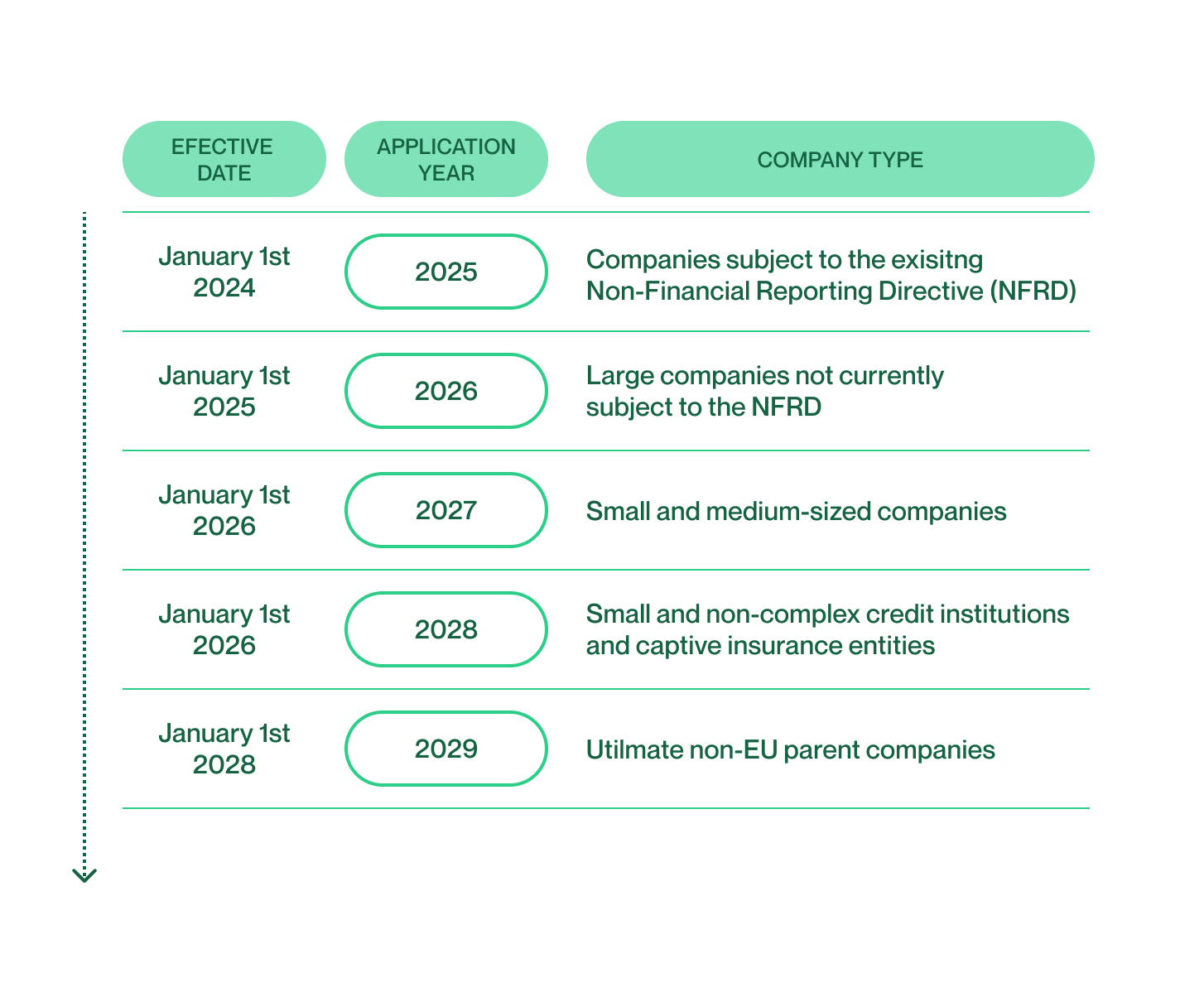CSRD - Corporate Sustainability Reporting Directive
The Corporate Sustainability Reporting Directive (CSRD) is a groundbreaking regulatory framework established by the European Union (EU) to elevate sustainability reporting standards and requirements. As of January 5th, 2023, the CSRD, written on December 14th, 2022, came into effect, expanding the reporting obligations for companies and promoting standardized practices across the EU. With its comprehensive approach, the CSRD aims to enhance the quality and comparability of sustainability information disclosed by companies, facilitating informed decision-making and accurate assessment of sustainability performance.
The CSRD applies to a significantly larger number of companies compared to its predecessor, the Non-Financial Reporting Directive (NFRD). While the NFRD covered approximately 11,000 companies, the CSRD extends its reach to nearly 50,000 companies. This includes not only large EU-based companies but also large companies based outside of the EU. Companies meeting at least two of the following three conditions will be required to comply with the CSRD:
A net turnover of €40 million
Assets totaling €20 million
A workforce of 250 or more employees.
Moreover, non-EU companies with a turnover exceeding €150 million in the EU will also be subject to the CSRD.
Small and medium enterprises (SMEs) face different requirements under the CSRD. Generally, the CSRD does not impose new reporting obligations on non-listed SMEs, except for those with securities listed on regulated markets. To simplify reporting for listed SMEs, they are allowed to utilize simplified standards. However, the European Commission has proposed developing separate standards tailored to the capabilities of non-listed SMEs. These voluntary standards would enable SMEs to report information to banks, clients, and investors, thereby supporting their role in the transition to a sustainable economy.
The CSRD mandates companies to disclose their sustainability information in their management reports, ensuring that financial and sustainability data are published simultaneously. To facilitate easy checking and comparison, the sustainability data must be submitted in a standardized digital format, which will be accessible through the European single access point database. Furthermore, the submitted data will undergo a process of "limited third-party assurance," requiring an auditor to evaluate the accuracy and reliability of the information.
The development of reporting standards for the CSRD is being undertaken by the European Financial Reporting Advisory Group (EFRAG), a private association financed by the EU. EFRAG announced proposed standards on May 2nd, 2022, which are intended to be applicable across all sectors. These standards include the requirement to consider double materiality, meaning companies must assess both their impact on and vulnerability to climate change. Additionally, value chain sustainability factors are to be incorporated, necessitating the reporting of scope 3 emissions. These emissions result from a company's indirect activities upstream and downstream in its value chain. Measuring scope 3 emissions is a complex task that requires careful attention, so companies are encouraged to initiate the process as soon as possible to ensure compliance with CSRD mandates.
The CSRD will be implemented gradually, with different timelines for various categories of companies.
Large public-interest companies already subject to the non-financial reporting directive, with over 500 employees, must comply from January 1st, 2024, with reports due in 2025.
Large companies not currently subject to the non-financial reporting directive, but with more than 250 employees and/or €40 million in turnover and/or €20 million in total assets, will be required to comply from January 1st, 2025, with reports due in 2026.
Listed SMEs and other undertakings must comply from January 1st, 2026, with reports due in 2027.
SMEs have the option to opt out until 2028.
Taking proactive measures now is crucial for companies to prepare for meeting the requirements of the CSRD. Although 2025 might seem distant, early planning and preparation will ensure a smoother transition when the regulations come into effect. It is worth noting that the CSRD is not the only initiative considering mandatory sustainability reporting, as numerous governing bodies are contemplating similar measures. By investing time and effort into preparing calculations and reporting practices, companies can stay ahead of the curve as new regulations are implemented, positioning themselves as leaders in sustainability and transparency.
References:
European Commission. (n.d.). Corporate Sustainability Reporting Directive (CSRD). Retrieved June 7, 2023, from https://ec.europa.eu/info/business-economy-euro/company-reporting-and-auditing/company-reporting/non-financial-reporting_en
European Commission. (n.d.). Corporate Sustainability Reporting Directive: Questions and Answers. Retrieved June 7, 2023, from https://ec.europa.eu/commission/presscorner/detail/en/qanda_21_3076
PricewaterhouseCoopers (PwC). (n.d.). Corporate Sustainability Reporting Directive (CSRD): Are you ready? Retrieved June 7, 2023, from https://www.pwc.com/gx/en/services/sustainability/sustainability-reporting/assets/pwc-sustainability-reporting-directive-csrd-brochure.pdf
Global Reporting Initiative (GRI). (n.d.). Corporate Sustainability Reporting Directive (CSRD): What you need to know. Retrieved June 7, 2023, from https://www.globalreporting.org/news/press-release-2021/2021-csrd-what-you-need-to-know/


